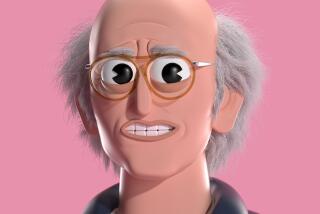LARRY’S PARTY.<i> By Carol Shields</i> .<i> Viking: 340 pp., $23.95</i>
- Share via
What do women want? In case anyone is still curious about, or exasperated by, the formerly second sex, this question is finally answered in Carol Shields’ new novel, “Larry’s Party”: “What we all really want is to marry the men we’d be if we were men.” This is one of those mildly startling lines that minor characters throw away at dinner parties, a line that shows how well Shields expresses the middle-class narcissism of our time.
“Larry’s Party” follows Shields’ enormously successful 1995 novel, “The Stone Diaries,” which won the Pulitzer Prize, the National Book Critics Circle Award and, because Shields lives in Canada, Canada’s Governor General’s Award. It was also short-listed for Britain’s Booker Prize. Any writer would be self-conscious, trying to follow such acclaim, and “Larry’s Party” appears a little hasty and uncertain. On the dedication page, Shields thanks 22 men who “offered suggestions.” This may suggest to her readers that Shields filtered her imagination through a consensus of experience.
Even before the novel opens, the hero, Larry Weller, is by implication a representative figure. “Deep down, all the men in the world are named Larry,” another character named Larry concludes. Shields’ hero is a walking, head-scratching cliche: “first the dreamy child, next the miserable adolescent.” Then he is a “husband, father, home owner, tuxedo wearer. An OK guy with work to do.” The novel chronicles his relationships with his two wives and his work as a floral designer and then as an internationally recognized designer of garden mazes, but only for what they reveal about Larry Weller, “master maze maker and a good egg too!”
The novel’s structure is essayistic, its content, as impersonal as sociological data. It is not dramatic. Each chapter offers an aspect of the hero: “Larry’s Work”; “Larry’s Penis”; “Larry’s Friends.” The reader then infers, from these isolated summaries, an overall impression of the representative man. The pleasures of this novel come from recognizing a human type and being amused or moved or educated by this recognition. So what are we to think of this character, Larry Weller?
His life is defined by social display, not by solitary illumination. He lacks the saving intellect that Cynthia Ozick gives her self-deceiving egoists, particularly in “The Cannibal Galaxy.” He lacks the despair that haunts John Cheever’s successful WASPs in his short stories. He chooses maze design because to him the maze suggests loss: a desire to lose himself or, more regressively, a desire “to cradle his consciousness in a nest of softness. . . . Safety.” His fascination with the maze, its hedges (“holly, lime, whitethorn, box”) and “the unexpected rapture of being blindly led,” allows him to fragment and diffuse and then forget his confusing sexual desires. His first wife accuses him repeatedly of an unhealthy obsession with “bushes,” but he does not agree or disagree. He does not respond with anger or pain or reply with any force or penetration but, instead blinks “away the ghost of his father’s face,” knowing that “he could dispel the face by filling up his head with the greenness of hedgerows.” This fleeting awareness is not developed. It is forgotten. And this forgetfulness that in a different fiction could be used to illuminate character instead keeps Larry from himself and from the reader: “His cross-hatched look of bewilderment is half his charm--he knows this, but persuades himself, and others, that he doesn’t.” Is the clueless man the “sensitive man,” devolving at the end of the century? If Larry Weller is our representative man, then he represents the unexamined life, and it is not only a life worth living but also one preferred.
In Shields’ final chapter, a dinner party discussion occurs around the question, “What’s it like being a man these days?” “I’m a little tired of men always being buffoons,” one guest confesses. “What ever happened to men who had dignity and courage?” Larry’s second ex-wife notes, “Confusion is the natural climate--the only climate for the post-feminist age. . . . We’ve had 5,000 centuries of perfect phallic clarity.” Larry Weller belatedly answers, “Ouch.”
Some readers may glimpse, in his limited articulation, unspoken depths. Others may question his persistent lack of vitality or clarity or any incisiveness that hints at testosterone. At the novel’s end, Larry looks around his dinner table at the lively conversation advanced by his sister Midge and his two ex-wives. He sees how much vitality women add to his life. He does not see, though, what happened to his own vitality or why he feels alive second-hand, after listening to these women verbally thrust and parry.
The hero may also, amusingly, represent the man a woman would be if she could marry a penile version of herself. Of all the men she could imagine, she would choose a clueless man? And by his side, at his party, see how “lively” she appears. Is this also what women want? Carol Shields’ novel raises such questions on the limited choices that result from unexamined lives. Shields’ provocative hero offers her readers an excellent conversation piece for dinner parties. “Larry’s Party” is a curiously unsettling comedy of our time.
More to Read
Sign up for our Book Club newsletter
Get the latest news, events and more from the Los Angeles Times Book Club, and help us get L.A. reading and talking.
You may occasionally receive promotional content from the Los Angeles Times.










